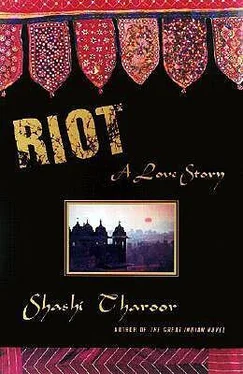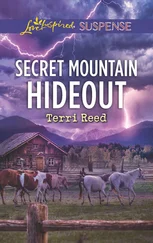Oh, there were moments of high drama. At one point Gurinder, the SP, spotted a frenzied young man brandishing a 12-bore rifle. I have no idea whether he was Hindu or Muslim. At that point neither of us cared where the violence was coming from; we just wanted to stop it. The SP jumped off his jeep and walked towards the young man. He screamed at us, pointed his rifle at the SP and threatened to shoot. Undeterred, the SP kept moving, slowly advancing towards him. The young man looked wildly about, and the rifle wavered in his hands, but he did not fire. Tears were streaming down his face as the SP advanced, tears of rage and fear and sorrow, and his hands were trembling, the rifle jerking uncontrollably in his grasp. When the SP reached him he was practically begging to be saved from himself. Gurinder overpowered him, snatched his rifle, and forced him into a nearby house, which he locked from the outside. I never found out who the young man was, or what his story was. I knew he had reason to be out of his mind with fear. We never prosecuted him.
Soon an uneasy calm fell over the city under curfew. Additional force was called from neighboring districts, and permanent pickets established at all sensitive points. I pressed all my executive magistrates into duty, and spent the whole night scouring the city in mobile patrols with the police.
Gurinder was a hero. He cursed, he swore, he joked, he grinned maniacally, but he was everywhere by my side. Together we ordered large-scale preventive arrests and searches: that first night alone, 126 persons were arrested. Forty houses were searched. I remember these facts vividly because this is what running a district is all about. Overkill, perhaps. But better overkill, Gurinder liked to say, than kill over. Over and over again.
We couldn’t forget the ones who had been killed — the ones we knew about, again excepting Priscilla. We had to contact their families, help control their grief, and above all ensure that each death didn’t lead to five more. Funerals are the perfect excuse for violence; all that grief and rage looking for an outlet. So we talked to the families of the deceased, and organized quiet cremations and burials in the presence only of close family members, and the magistrates and the police. They weren’t all that happy about it, but we took advantage of the fact that they were numbed by pain and grief, and we gave them no choice in the matter.
I decided there would be no relaxation of curfew for seventy-two hours. We kept things calm, except that four more mosques were extensively desecrated in the course of the night. The Muslim community leaders insisted that this could not have been possible without police complicity. Even Gurinder could not be sure that some of his own men hadn’t connived at what happened.
That had probably been during the brief moments that we finally got some sleep. I felt terribly guilty: if I had stayed awake, continued on patrol, perhaps this wouldn’t have happened. Gurinder and I snatched two hours of sleep in the police station that Saturday night. We slept on camp cots, fully dressed and ready to rush out at the report of any clash. In any case, after two hours’ rest, we got up and resumed our patrols. The people of Zalilgarh were to become deeply familiar with our white Gypsy and its flashing red light, endlessly prowling the shadowy and deserted lanes and by-lanes of the town.
But who could have had time for sleep, or been able to sleep if we found the time? The control room we established was deluged by a continuous barrage of complaints of mob assault, all of which had to be checked out. Most proved to be untrue; rumors were rife. The press was called in and briefed. We made arrangements for the distribution of newspapers throughout the city beginning the next day, in order to control the rumors and disinformation. The peace committee and responsible leaders of the two communities were called in and pressed into service. In the days to come, they helped keep the calm.
I’m not trying to avoid talking about Priscilla Hart. I just want to complete the picture of this riot for you, Mr. Diggs, so you understand what we were dealing with during those days. The damaged mosques were certain to cause more trouble as soon as the curfew was relaxed. So I mobilized the services of the Public Works Department to repair and restore the desecrated mosques, overnight. Overnight! I did so with the support of moderate Muslim leaders, who had to be present while the work was being done, to ensure that nothing sacrilegious occurred during the repairs. When it was done I was able to order the first relaxation of the curfew, for two hours. The Muslims wended their way straight to the mosques to offer prayers, but the fresh paint and mortar told their own story. The settlements that had suffered arson looked as if they had been bombed. But except for a solitary explosion just before curfew relaxation was to end — an explosion in which no one was injured — there were no major setbacks during this first easing of curfew.
One more thing, while I’m giving you this portrait of the riot. On the second morning of the curfew, I received a flash message on the mobile wireless that over two hundred women and children in a Muslim mohalla had poured onto the streets, defying the curfew. I got Gurinder and rushed there. There was a throng of women, most in veils or burqas, almost all accompanied by wailing children. Amidst the disconsolate weeping, one woman said: “There is now not a grain of food or a drop of milk in our homes. Our men have either been rounded up by the police or have run away and are in hiding. We earn and eat from day to day. It’s all very well for you to impose a curfew. But how long can we let our children starve?”
I didn’t have a good answer to the woman, but I promised her I would find one. In my heart I had to do something for the sake of Priscilla, who had worked so hard for the Muslim women of Zalilgarh. I went back to the police station and immediately sent for all the senior district officers. “Right,” I said. “You’ve kept the peace. Now you have an additional job. You’re in charge of ensuring civil supplies. Get the wholesale traders to open their godowns. Organize mobile vans with essential commodities for each mohalla. We’ve got to get food to families.”
“And what about the curfew?” one fellow asked. “If we lift it to distribute food, we’ll soon be back where we started.”
“No,” I replied. “We’ll lift the curfew only for women during the visits of the mobile vans to each mohalla. During this time they can make their purchases. Any man who ventures out will still be in violation of the curfew.” This one’s for you, Priscilla, I thought.
“What about those who can’t afford to make purchases?” another asked. “Many of them are day laborers. They eat when they work. They won’t have spare cash sitting around for food. Especially in some of the poorer bastis, and the Dalit areas.”
He had a valid point. So I ordered that ten kilograms of grain be distributed free to each poor family, and promised the traders that the district administration would make good the cost by donations later.
I beg your pardon? Of course. I’m sorry I got carried away. You’re not really doing a story on how we managed the riot. You’re doing a story about Priscilla. I’m sorry.
Of course, I shouldn’t have spoken of a total of just seven deaths, should I? There was an eighth one, neither Hindu nor Muslim.
Priscilla’s.
from Lakshman’s journal
August 3, 1989
He lies back and feels her peel the layers off him. His nakedness is a discovery, a baring of the self. She explores him with her long fingers, her touch opening him like a wound. He stirs. Her tongue caresses him now, a soft furriness on the inside of his thigh. He is in pain but the pain is exquisite and profound. He opens his eyes, seeing her move above him, her hair cascading around her face like a golden cloudburst. Her tongue scurries over his midriff and he makes an involuntary sound, an unfamiliar sound, half gratitude, half interrogation. The air around him seems to crackle with her charge. She has taken possession of him now, drawing his fullness into her mouth. He moves instinctively under her, but her fingers on his hip are firm as she continues, stilling all but the center of his being. He does not think any more of thrust and counterthrust but lets her take him in, her each breath a whisper to his heart. She is moving faster now, her lips surrounding him like the embrace of the ocean, and he is barely conscious of the tremors in his body, the piercing sweet pain of each stroke, until he trembles and gasps into her from every pore of his body. She does not stop as he shudders, feeling his soul empty into her like a confession.
Читать дальше












